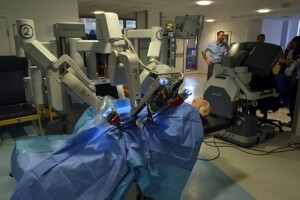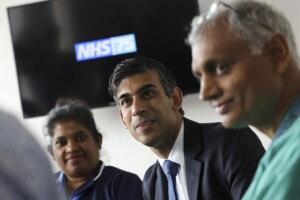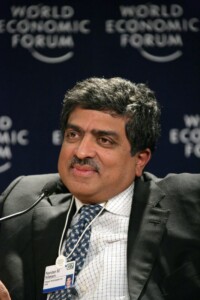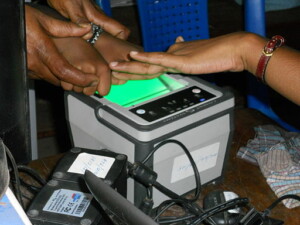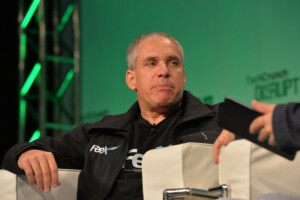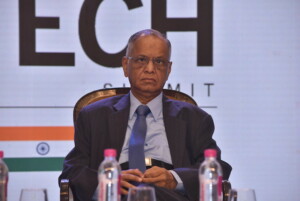Infosys: Rishi Sunak, Big Tech and the NHS
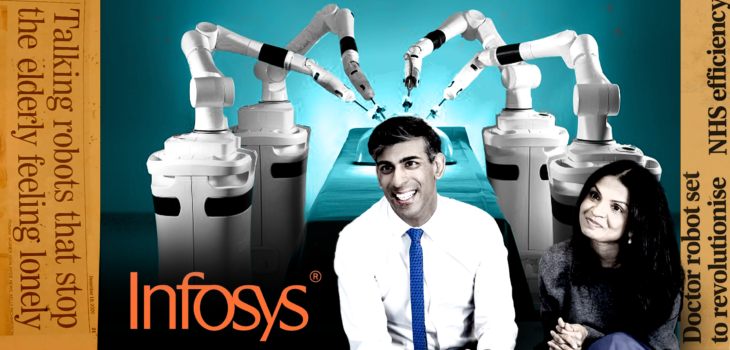
The latest Sunday Times Rich List reported that Rishi Sunak and his wife, Akshata Murty, already the wealthiest occupants of number 10 Downing Street, jumped 30 places further up the rankings in just one year. This is in large part due to Murty’s £590m stake in her dad’s company, Infosys. At the height of a devastating cost of living crisis, the value of Murty’s stake has more than quadrupled in the last 12 months.
Corporate Watch takes a look at the Big Tech firm behind the number 10 couple. We found:
- A few months after Sunak came to office, Infosys won a share of a major ‘Intelligent Automation’ contract with the NHS.
- The company is developing the expansion of AI in the public health sector, from robotic surgeons, to virtual nursing assistants.
- Besides Sunak’s wife’s investment, Tory MP Jacob Rees-Mogg also enjoys a major stake in Infosys via his asset management firm, Somerset Capital.
- Infosys has links to Israeli military intelligence units and to the largest biometric ID system in the world, the Aadhaar database in India.
INFOSYS LTD
Founded in 1981, Infosys Ltd became the first Indian IT company to be listed on the US NASDAQ stock market, and has grown to become one of the country’s largest tech and consultancy com
panies. It was co-founded by Sunak’s father-in-law, and one of India’s richest men, N.R. Narayana Murthy; a billionaire who thinks Indian youngsters should work a 70 hour week. His company has been fined over $35m (£27.5m) in the US since 2000 for fraud and repeated minimum wage violations.
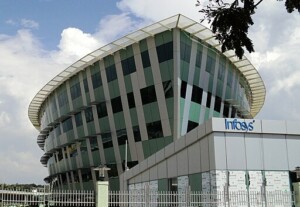
Infosys building Credit Binoyjsdk, CC BY 3.0
HIGH PROFILE INVESTORS
The Murthys aren’t the tech company’s only politically-connected profiteers. Jacob Rees-Mogg is partner, shareholder, and co-founder of Somerset Capital Management, a firm accused of exploiting markets during the pandemic. The asset management company, set up in 2007 in London, has £105m stake in Infosys (Dec 23). Its other co-founder of Somerset Capital is Lord Dominic Johnson. He left his position as CEO to become minister for investment under Sunak. Although Somerset Capital is now being wound down, it has enabled both Tories to profit from Infosys via its stock holdings in the firm.

Jacob Rees-Mogg, credit Simon Dawson
In early 2024, Johnson, as minister of state for business and trade, visited Infosys officials in India. Johnson expressed support for the company and said his department would help with visas, make sure that policies were favourable, and was keen to get Infosys more work in the UK.
Climate wrecker and the world’s biggest asset manager, BlackRock is one of Infosys’ biggest shareholders, giving it substantial interest in the company. The asset manager is also currently on Labour’s infrastructure council, ‘helping’ with policies on housing and energy for their predicted election win.
INFOSYS IN THE NHS
Infosys, along with other tech giants, profited from working in the NHS during the pandemic. But the company wants more work with the world’s biggest public health service and believes that its well-placed to help the NHS develop technologically with AI.
Virtual nursing assistants, robots doing surgeries, AI diagnoses, and streamlined processes are all elements of the tech company’s vision for AI in healthcare. In 2023, a few months after Sunak became prime minister, Infosys won its biggest NHS contract to date. The contract is for ‘Intelligent Automation’ with NHS Shared Business Services; an integral part of the NHS and a joint venture between the Department of Health and Social Care (DHSC) and private multinational, Sopra Steria. This contract is worth £250m and shared with 25 other private companies.
According to the company’s own reports, intelligent automation means “(n)udges to managers and employees”, chatbots and “Robotic Process Automation”.
In April 2024, the company won a place on another shared NHS contract for ‘Non-Clinical Systems’ worth £1.5bn. This framework gives Infosys access to over 40 Trusts across England. The terms of the contract also enable Infosys to work with Scotland, Wales and Northern Ireland and across areas of the NHS, including Integrated Care Systems (ICS), GPs, dentists and arm’s length bodies.
Other work includes two contracts worth a combined £5.3m for IT services with the Medicines and Healthcare products Regulatory Agency (a part of the DHSC which is also run by private big pharma). The first starting in 2018 and the second ending in 2023. The company has also made £21.6m from Care Quality Commission (also a part of the DHSC) contracts since 2015.
INTERNATIONAL WORK
The company’s healthcare work is not limited to the UK. In its 2023 annual report it bragged about providing infrastructure for Molina Healthcare, a US company that recently paid out millions after allegations were made against it for allowing unqualified mental health workers to give patient care.
In 2022 Infosys bought the international life sciences tech company, Base Life Science. And it is currently partnered with IQVIA, which is working with Palantir on the massive new Federated Data Platform contract.
Billionaire, Nandan M. Nilekani, is Infosys chair and co-founder. He’s also a former Indian government official, infamous for his role in building the Indian Aadhaar database. This is the world’s largest biometric ID system, controversially used by spyware fan and prime minister, Narendra Modi, for civilian surveillance. Nilekani credits Modi personally for the invasive Aadhaar database initiative that they imposed upon the country together.
Infosys uses biometric technology too, including facial recognition. The company has key IT and data contracts with the Indian Government, although it’s not clear if the state is using its biometric systems in the surveillance of people in India, including Muslim rights protestors.
LINKS TO ISRAEL
Alongside its access to top Indian and UK government officials, Infosys also has several close connections to secretive Israeli military units.
Until April 2023, Uri Levine was an Independent Director at Infosys. He is a former member of clandestine Israeli Defence Forces (IDF) intelligence Unit 8200. But that’s not Infosys’ only Israeli military connection.
In 2015, Infosys acquired Panaya Ltd, an Israeli tech company. Vishal Sikka was Infosys CEO at the time. He resigned in 2017, in part due to concerns made public by whistle blowers around the allegedly overvalued payment for Panaya of £211.7m (todays equivalent). Sikka now sits on the board of Oracle Corporation.
Other unsavoury characters linked to Panaya include Tal Arnon spent 12 years working in Israeli military intelligence before joining the company. He is currently vice-president of research and development. Most of his time at the IDF was spent at the covert tech Unit 8153. In January 2024, Panaya hired Stav Grinshpon, another Unit 8200 veteran.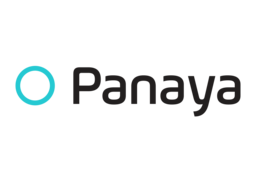
Panaya’s CEO is David Binny. Before this role he worked as a senior manager at NICE Systems for 14 years. NICE is a £8.2 billion (June 24) Israeli software and AI company that was created by members of Unit 8200.
INFOSYS IN FIGURES
Infosys works across 56 countries and has over 300,000 employees. Even though it’s an Indian company, 60% of revenue comes from the US with just 2.5% coming from India.
In 2024, the tech giant’s revenue was $18.6bn (£14.6bn) and net profit $3.1bn (£2.4bn). The company says its future focus is Artificial Intelligence (AI), generative AI (machine learning driven content, ie ChatGBT), and cloud technologies, both outside and inside the company. Employees have reported Big Brother style tech being used to monitor their work. An Indian newspaper quoted staff saying:
“Earlier they wanted to make us stay in office for nine hours. Now, they want to measure how much time we spend on computers. These policies are completely out of sync with the times”
(Infosys senior staff speaking to reporters in India)
Infosys have already spent $90,000 (£70,770) on lobbying in the first quarter of 2024 in the US. In 2023 it forked out a total of $340K (£268K). It’s less clear what lobbying the private company might be involved with in the UK, but Indian trade association NASSCOM represents Infosys, and lobbies the UK and other governments on behalf of its clients. NASSCOM appears to mainly concern itself with promoting the loosening of immigration restrictions and digital trade.
CONCLUSION
Infosys is yet another example of a company with a dubious record and links to authoritarian regimes which is able to profit from NHS privatisation and wider public sector outsourcing.
With a general election looming in the UK it’s safe to say a change of government isn’t going to reverse the already deeply entrenched privatisation of the NHS. Both Tories and Labour have been slammed for election promises that would be worse than the peak years of austerity for the NHS.
It’s clear that the fight to save the NHS won’t happen in the halls of parliament. For more info on how to get involved in your local campaign to save our NHS, check out patient-led campaigns with Just Treatment, find your local branch of Keep Our NHS Public or join forces to fight privatisation with We Own It.
————————————————-
Appendix: Addresses
14th Floor, 10 Upper Bank Street, Canary Wharf, London, England, E14 5NP


